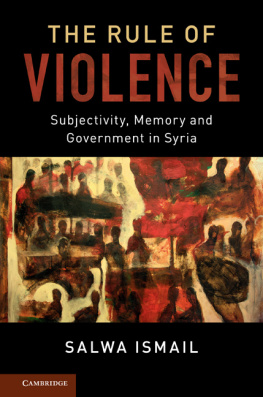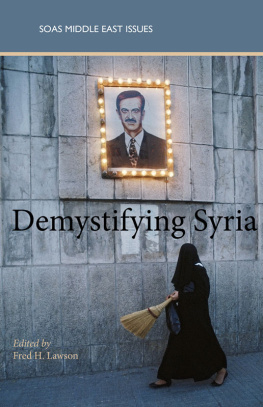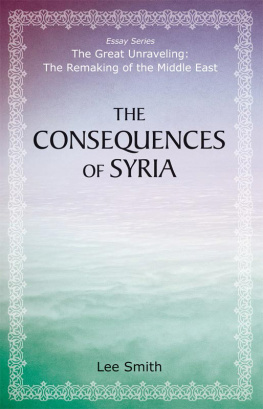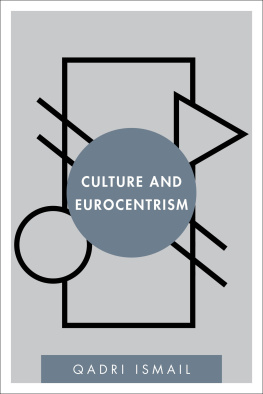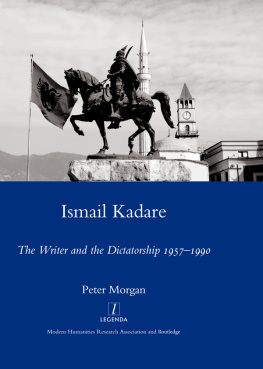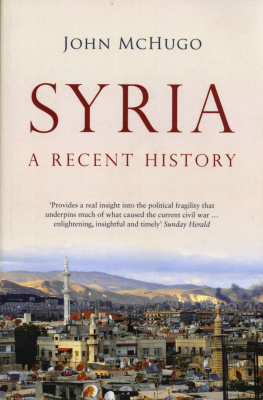Ismail - The Rule of Violence : Subjectivity, Memory and Government in Syria
Here you can read online Ismail - The Rule of Violence : Subjectivity, Memory and Government in Syria full text of the book (entire story) in english for free. Download pdf and epub, get meaning, cover and reviews about this ebook. year: 2018, publisher: Cambridge Univ Pr, genre: Politics. Description of the work, (preface) as well as reviews are available. Best literature library LitArk.com created for fans of good reading and offers a wide selection of genres:
Romance novel
Science fiction
Adventure
Detective
Science
History
Home and family
Prose
Art
Politics
Computer
Non-fiction
Religion
Business
Children
Humor
Choose a favorite category and find really read worthwhile books. Enjoy immersion in the world of imagination, feel the emotions of the characters or learn something new for yourself, make an fascinating discovery.
The Rule of Violence : Subjectivity, Memory and Government in Syria: summary, description and annotation
We offer to read an annotation, description, summary or preface (depends on what the author of the book "The Rule of Violence : Subjectivity, Memory and Government in Syria" wrote himself). If you haven't found the necessary information about the book — write in the comments, we will try to find it.
Ismail: author's other books
Who wrote The Rule of Violence : Subjectivity, Memory and Government in Syria? Find out the surname, the name of the author of the book and a list of all author's works by series.
The Rule of Violence : Subjectivity, Memory and Government in Syria — read online for free the complete book (whole text) full work
Below is the text of the book, divided by pages. System saving the place of the last page read, allows you to conveniently read the book "The Rule of Violence : Subjectivity, Memory and Government in Syria" online for free, without having to search again every time where you left off. Put a bookmark, and you can go to the page where you finished reading at any time.
Font size:
Interval:
Bookmark:

The Rule of Violence
Over much of its rule, the regime of Hafez al-Asad and his successor Bashar al-Asad deployed violence on a massive scale to maintain its grip on political power. In this book, Salwa Ismail examines the rationalities and mechanisms of governing through violence. In a detailed and compelling account, Ismail shows how the political prison and the massacre, in particular, developed as apparatuses of government, shaping Syrians political subjectivities, defining their understanding of the terms of rule and structuring their relations and interactions with the regime and with one another. Examining ordinary citizens everyday life experiences and memories of violence across diverse sites, from the internment camp and the massacre to the family and school, The Rule of Violence demonstrates how practices of violence, both in their routine and spectacular forms, fashioned Syrians affective life, inciting in them feelings of humiliation and abjection, and infusing their lived environment with dread and horror. This form of rule is revealed to be constraining of citizens political engagement, while also demanding of their action.
Salwa Ismail is Professor of Politics with reference to the Middle East at the School of Oriental and African Studies, University of London. Her research focuses on everyday forms of government, urban governance and the politics of space. She has published on Islamist politics and on statesociety relations in the Middle East and is the author of both Rethinking Islamist Politics: Culture, the State and Islamism (2003) and Political Life in Cairos New Quarters: Encountering the Everyday State (2006). Her recent publications have appeared in Comparative Studies in Society and History, Third World Quarterly, Social Research and Contemporary Islam .
Charles Tripp (general editor)
Julia Clancy-Smith
F. Gregory Gause
Yezid Sayigh
Avi Shlaim
Judith E. Tucker
Cambridge Middle East Studies has been established to publish books on the nineteenth- to twenty-first-century Middle East and North Africa. The series offers new and original interpretations of aspects of Middle Eastern societies and their histories. To achieve disciplinary diversity, books are solicited from authors writing in a wide range of fields including history, sociology, anthropology, political science and political economy. The emphasis is on producing books affording an original approach along theoretical and empirical lines. The series is intended for students and academics, but the more accessible and wide-ranging studies will also appeal to the interested general reader.
The Rule of Violence
Subjectivity, Memory and Government in Syria
Salwa Ismail
University of London


University Printing House, Cambridge CB2 8BS, United Kingdom
One Liberty Plaza, 20th Floor, New York, NY 10006, USA
477 Williamstown Road, Port Melbourne, VIC 3207, Australia
314321, 3rd Floor, Plot 3, Splendor Forum, Jasola District Centre, New Delhi 110025, India
79 Anson Road, #06-04/06, Singapore 079906
Cambridge University Press is part of the University of Cambridge.
It furthers the Universitys mission by disseminating knowledge in the pursuit of education, learning and research at the highest international levels of excellence.
www.cambridge.org
Information on this title: www.cambridge.org/9781107032187
DOI: 10.1017/9781139424721
Salwa Ismail 2018
This publication is in copyright. Subject to statutory exception and to the provisions of relevant collective licensing agreements, no reproduction of any part may take place without the written permission of Cambridge University Press.
First published 2018
Printed in the United Kingdom by TJ International Ltd. Padstow Cornwall
A catalogue record for this publication is available from the British Library.
Library of Congress Cataloging-in-Publication Data
Names: Ismail, Salwa, author.
Title: The rule of violence : subjectivity, memory and government in Syria / Salwa Ismail.
Description: New York: Cambridge University Press, 2018. |
Series: Cambridge Middle East studiesIdentifiers: LCCN 2018007398| ISBN 9781107032187 (hardback) | ISBN 9781107698604 (paperback)
Subjects: LCSH: Syria Politics and government 19712000. | Syria Politics and government 2000 | Political violence Syria History 20th century. | Political violence Syria History 21st century. |
BISAC: POLITICAL SCIENCE / Government / International.
Classification: LCC DS98.4.I86 2018 | DDC 956.9104/22dc23
LC record available at https://lccn.loc.gov/2018007398
ISBN 978-1-107-03218-7 Hardback
ISBN 978-1-107-69860-4 Paperback
Cambridge University Press has no responsibility for the persistence or accuracy of URLs for external or third-party internet websites referred to in this publication and does not guarantee that any content on such websites is, or will remain, accurate or appropriate.
This book undertakes a quest to understand how Syrians experiences of political violence, both spectacular and routine, became formative of the Syrian polity over the decades of al-Asad rule (1970 onward). My interest in pursuing this quest formed during a period of fieldwork in Syria in 2005. The immediate political context, then, was marked by the suppression of the civil society movement that had emerged in 2000 and took organised expression in a number of discussion forums, in publications such as semi-independent cultural magazines and in artistic works. Although, at the time, the security services were arresting regime critics and silencing opponents, activists maintained hope and showed much personal courage in pressing for political change.
As an observer and participant in public cultural activities that took place in carefully circumscribed spaces of discussion and debate such as the al-Attasi Forum (closed in June 2005), the Journalists Syndicate Club and the Institut Franais du Proche Orient (IFPO), I both witnessed and experienced practices of silencing and of self-censorship. These practices drew the boundaries of what could and could not be said, establishing thresholds of the permissible in speech that were not to be crossed. Paradoxically, however, they gave rise to debate and disagreements among cultural activists and other engaged Syrians precisely about the contours of borders of public discourse and whether they should be observed. Yet many debates and discussions that inevitably veered towards the past, and proffered diagnostics of authoritarian rule to explain the countrys political impasse, closed off pathways of memory and of reading the present in light of past experiences of violence, especially extreme violence.
In the course of interviews and conversations, a puzzle arose as much from my interlocutors silences and ellipses as from their statements and declarations. In personal discussions with a number of politically engaged Syrians activists in the civil society movement, dissident writers and former political prisoners the authoritarian past and the dominance of the security services were commonly invoked themes. These themes prefaced the cultural and civil activists analysis of the constraints on their action and the challenges they faced in their struggle for political opening and accountability. The name of Hafez al-Asad was uttered to invoke, in an almost mythical sense, a figure of dictatorship that pervaded all aspects of political, social and cultural life and stunted political growth. The silence about the Hama violence in my interlocutors narratives of the not-too-distant political past was expressed in interrupted speech. In private or more intimate accounts of al-Asads dictatorship, the atrocities committed by the regime in Hama remained largely unspoken a seemingly absent sign and referent.
Font size:
Interval:
Bookmark:
Similar books «The Rule of Violence : Subjectivity, Memory and Government in Syria»
Look at similar books to The Rule of Violence : Subjectivity, Memory and Government in Syria. We have selected literature similar in name and meaning in the hope of providing readers with more options to find new, interesting, not yet read works.
Discussion, reviews of the book The Rule of Violence : Subjectivity, Memory and Government in Syria and just readers' own opinions. Leave your comments, write what you think about the work, its meaning or the main characters. Specify what exactly you liked and what you didn't like, and why you think so.

